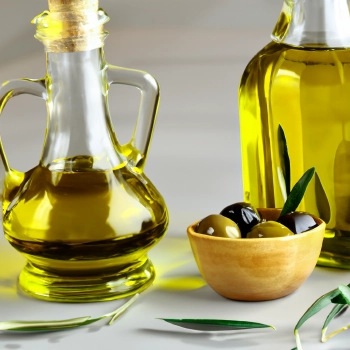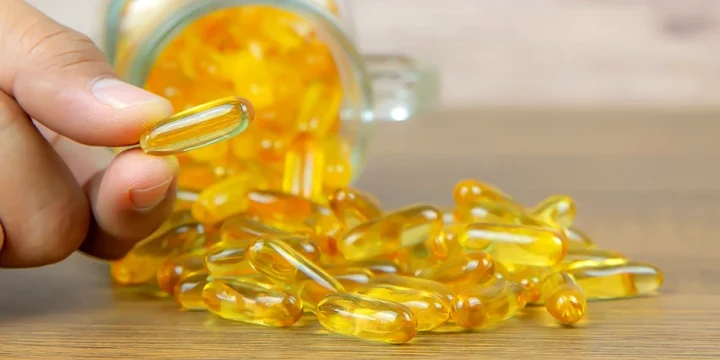In the ongoing debate between natural remedies and supplements, olive oil and fish oil stand out for their numerous health benefits.
But which one really helps with boosting your well-being and getting the most out of your health regimen?
After doing in-depth research and putting these two oils to the test, we've uncovered some fascinating insights. Keep reading and find out which one is most suited for your lifestyle.
Quick Summary
- Olive oil offers benefits such as enhanced mental focus, increased energy, improved stamina, muscle building support, and better bone health.
- Fish oil provides benefits such as reduced fatigue, improved cardiovascular health, decreased inflammation, and support for muscle recovery.
- One tablespoon of olive oil provides 119 calories, 1.9 mg of vitamin E, and 8.13 of vitamin K, whereas fish oil supplements typically contain 180 mg of EPA and 120mg DHA.
- I am sure that both olive oil and fish oil have their unique advantages and can be combined for enhanced health benefits.
What Is Olive Oil?

Extra Virgin Olive Oil (EVOO) is the unrefined fruit juice of olives with water and solids removed through centrifugation.
From my personal experience, Extra Virgin Olive Oil (EVOO) has been a staple in my kitchen. I love its rich flavor and the way it complements my dishes.
This oil packs nutrition in the form of antioxidants like polyphenols, tocopherols, phytosterols, squalene, and terpenic acids.
One tablespoon is equivalent to 13.5 g of olive oil that provides 119 calories, 1.9 mg of vitamin E, and 8.13 of vitamin K [1].
Benefits of Olive Oil
I've always found the extra virgin form to be a game-changer in my fitness journey. It's not just beneficial for those who want to stay active and fit, but from my own experience, a diet rich in its healthy fats provides sustained energy, especially compared to diets heavy in saturated fats.
Here are some known benefits of olive oil:
- It enhances mental focus - The fatty acids in EVOO enhance mental focus and ensure a better workout performance.
- It boosts energy - The essential fatty acids in oil extracts from olives give off energy that serves as energy boosters during high-intensity workouts.
- It improves stamina - Daily intake also offers heart health needed for higher stamina by improving blood pressure and lowering cardiovascular disease risk.
- It helps muscle building - Oil extracts from olives help absorb cholesterol from food and convert it to testosterone, which is necessary for muscle building.
- It promotes better bone health - Studies showed that oleic and polyunsaturated fatty acids work harmoniously to build bone tissue and allow the body to regenerate [2].
Other known health benefits include weight loss by controlling excess insulin production, fights mood disorders by balancing hormones, and slows down the aging process by reducing cellular stress.
Side Effects
Olive oil is safe to use but should be in moderation [3]. Some people exhibit nausea when taken in large doses due to the high calories.
Recommended Dosage
A 240 daily caloric intake source is drinking two tablespoons or 28 grams of plain olive oil [4].
The most important thing to remember is never to cook at a high temperature of not more than 374 degrees Fahrenheit to enjoy the full taste and maximize the antioxidants [5].
What is Fish Oil?

Fish oil is a nutritional supplement harvested from oily fatty fish and other seafood sources [6].
I started taking fish oil supplements a few years ago upon a friend's recommendation. I've noticed a significant difference in my overall health since incorporating it into my routine.
Fish oil supplements are a great source of 1000 mg Omega 3 Fatty Acids. It contains 180 mg of EPA (Eicosapentaenoic acid) and 120mg DHA (Docosahexaenoic acid). When taken daily, two capsules can give you 25 calories from 2 grams of fats. [7]
Benefits of Fish Oil
Here are some known benefits of fish oil:
- It reduces fatigue - 3 Fatty Acids help reduce fatigue and increase energy during a workout.
- It improves cardiovascular health - It can also improve cardiovascular health, which makes it a valuable supplement for endurance.
- It reduces inflammation - The absorption of Omega 3 Fatty acids reduces inflammation in the body, thus aiding in the fast recovery from muscle soreness after workouts [8].
Other known health benefits include preventing heart disease and maintaining immunity and strength.
Side Effects
While fish oils are generally safe to consume, be careful of any of these possible side effects.
- It may cause indigestion - The high caloric content of fish oil triggers indigestion and gives a feeling of heartburn, along with belching.
- It has a fishy smell and taste - The smell of fish where the oils are derived gives an impression of bad breath or a displeasing odor. A great way to reduce it is to take it frozen or with meals.
- It may trigger allergic reactions - Some people with existing allergies to seafood are most likely to develop skin rashes from fish oil.
- It may promote bleeding - Getting more than the recommended dosage of Omega 3 Fatty Acids might increase the chance of bleeding in severe cases. Please seek medical instructions before taking a high dosage.
Recommended Dosage
Fish oil is safe for most people when taken in adequate doses of 3 grams or less per day [9].
Nutritional Comparison
Olive oil, derived from pressed olives, is primarily composed of monounsaturated fats, specifically oleic acid. It is rich in antioxidants, such as vitamin E and polyphenols, which combat inflammation and oxidative stress.
Olive oil is also a source of iron, although its content is relatively low, and it contains no cholesterol. It is favored for its positive impact on heart health, potentially reducing the risk of cardiovascular diseases.
Conversely, fish oil supplements are derived from fatty fish like salmon, mackerel, and trout. They are abundant in omega-3 fatty acids, particularly eicosapentaenoic acid (EPA) and docosahexaenoic acid (DHA).
These essential fatty acids play a pivotal role in reducing inflammation, supporting brain function, and promoting cardiovascular health. Fish oil does not contain cholesterol and is renowned for its ability to lower levels of harmful LDL cholesterol.
Can You Combine Extra Virgin Olive Oil And Fish Oil Supplements?

Yes, you can combine olive oil and fish oil supplements.
I was curious about this too and even tried it myself. I found the combination to be quite beneficial for my health goals.
One study conducted in patients with Metabolic Syndrome concludes that increased intake of both oil extracts can reduce oxidative stress [10], thus fighting inflammation [11] in the body.
References:
- https://www.medicalnewstoday.com/articles/266258#nutrition
- https://www.ncbi.nlm.nih.gov/pmc/articles/PMC5714143/
- https://www.medicalnewstoday.com/articles/266258
- https://www.webmd.com/vitamins/ai/ingredientmono-233/olive
- https://www.healthline.com/nutrition/is-olive-oil-good-for-cooking
- https://www.medicalnewstoday.com/articles/40253#food-sources
- https://www.webmd.com/diet/health-benefits-fish-oil#1
- https://www.ncbi.nlm.nih.gov/pmc/articles/PMC7468920/
- https://www.medicalnewstoday.com/articles/324240
- https://pubmed.ncbi.nlm.nih.gov/25933490/
- https://www.hindawi.com/journals/omcl/2016/7432797/
About The Author
You May Also Like






